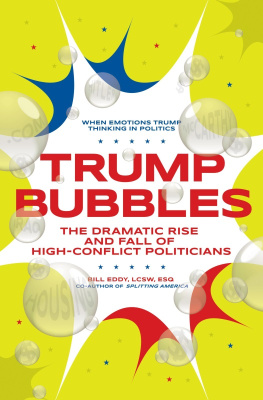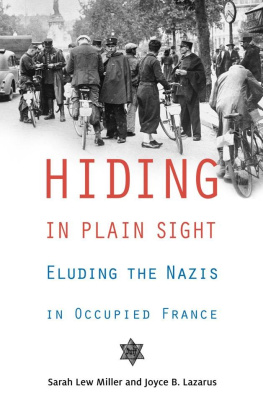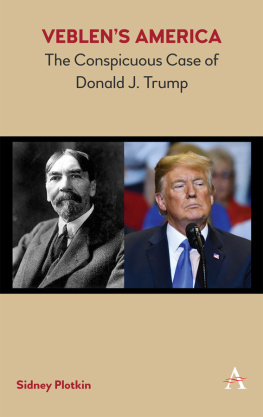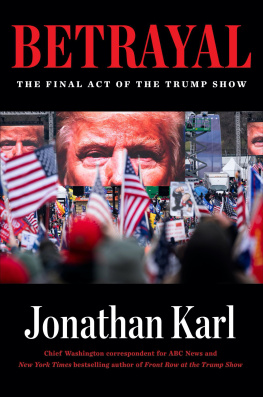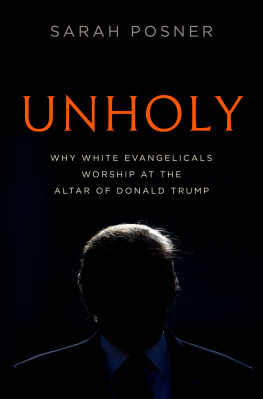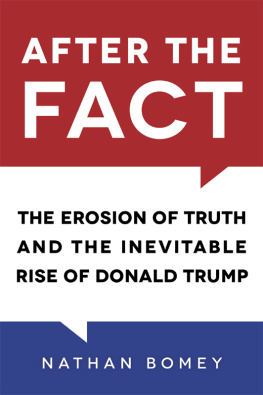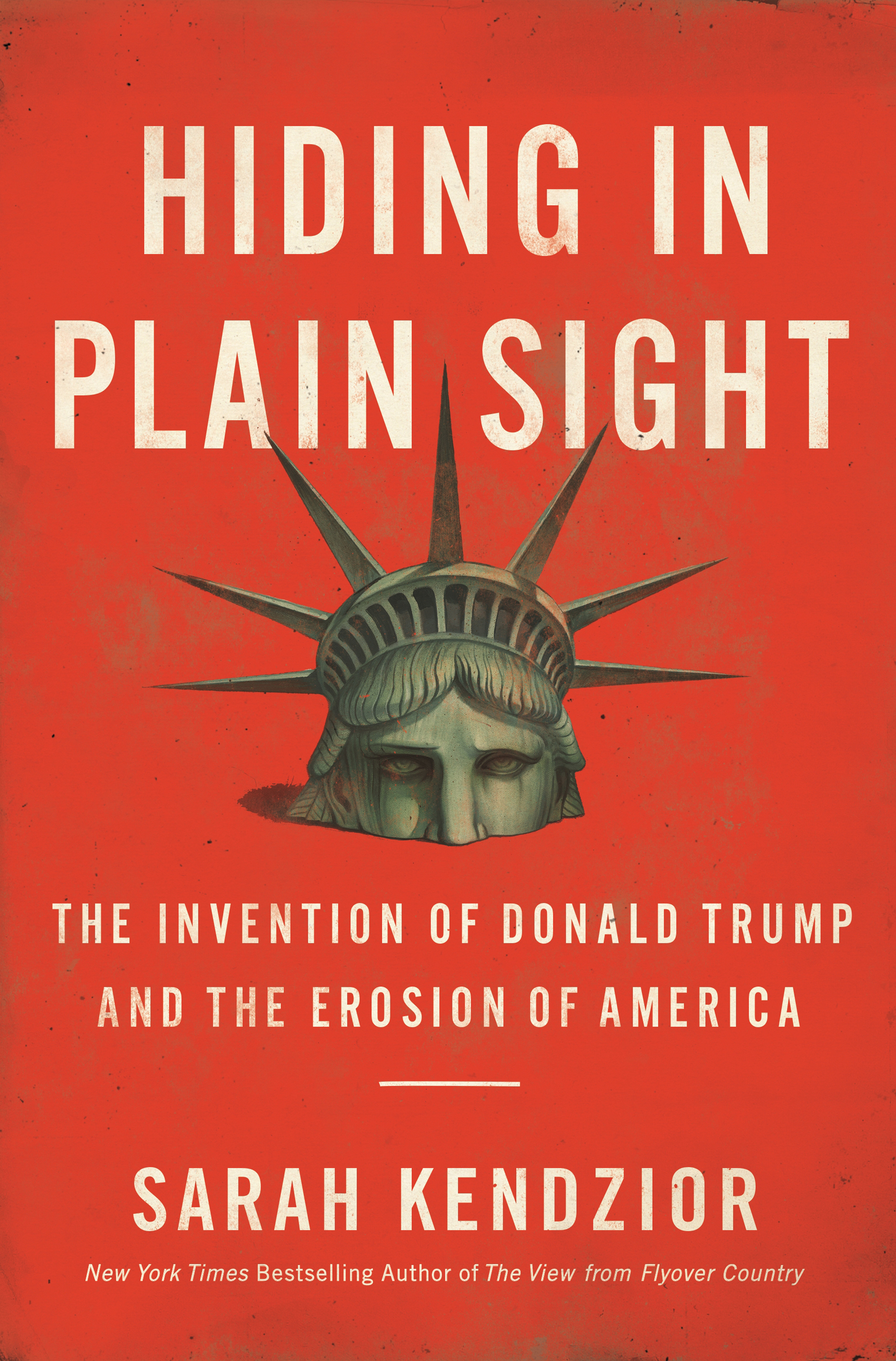I finished writing this book in the summer of 2019. More information has since emerged and will continue to emerge, but nothing will change the events that have occurred, are recorded in these pages, and will forever be a blight on Americas history.
The story of Donald Trumps rise to power is the story of a buried American historyburied because powerful people liked it that way. It was visible without being seen, influential without being named, ubiquitous without being overt.
The Trump administration is like a reality show featuring villains from every major political scandal of the past forty yearsWatergate, Iran-Contra, 9/11, the Iraq War, the 2008 financial collapsein recurring roles and revivals, despite the widespread desire of the public for the show to be canceled. From Roger Stone to Paul Manafort to William Barr, it is a Celebrity Apprentice of federal felons and disgraced operatives dragged out of the shadows and thrust back into the spotlightwith Donald Trump, yet again, at the helm.
The crises of political corruption, organized crime, and endemic racism are all connected, and they shape everyday American life. But in addition to these structural problems, we contend with specific powerful individuals who have acted against the public good for their entire careers. We see the same old men, again and again, vampires feeding on a nation and draining the lifeblood from words like treason and trauma and tragedy. They are buffered by backers who prefer to operate in silence, free from the consequences of scrutiny. There is a reason they call it a criminal underground: you walk over it every day, unaware it exists until the earth shakes below your feet.
In the eyes of autocrats and plutocrats, the future is not a right but a commodity. As climate change brings unparalleled crises, the future becomes a rare asset, meant to be hoarded like diamonds or gold. To millionaire elites, many of whom already had an apocalyptic bent, a depopulated world is not a tragedy but an opportunityand certainly easier to manage as they insulate themselves from the ravages of a literally scorched earth. The last four decades have led to the hoarding of resources on a heretofore unimaginable scale by people who have neither baseline respect for human life nor a traditional sense of the future. Their destructive actions have programmed a desperate generation to settle for scraps instead of settling the score.
Unless we were part of the opportunity-hoarding elitethe Ivankas and Jareds of the worldmy generation did not get to have choices. Instead we had reactions. We fought to hold on to what we had before it was stolen, while thieves demanded our gratitude and supplication. The opportunity-hoarding elite told us we were imagining the permanence of our plight and sold us survival as an aspiration.
This book tells the story of how they cornered that market.
It is a terrible feeling to sense a threat coming. It is worse when the threat reveals itself to be real, especially when many of those you warned still dismiss it, and you do not know whether their reaction is rooted in apathy or doubt or fear. What is a warning, in the end, if not a confessiona declaration of what you value and what you will fight to protect? To warn of a threat and be dismissed is to have your own worth questioned, along with the worth of all you strive to keep safe. But there is a price to be paid in persuasiveness, too. I used to think that the worst feeling in the world would be to tell a terrible truth and have no one believe it. I have learned it is worse when that truth falls not on deaf ears but on receptive ones. It is one thing to listen, it is another to careand yet another to act in time.
In fall 2015, I predicted that Donald Trump would win the presidential election, and that once installed, he would decimate American democracy. It was the latest in a career of issuing unheeded warnings. For years, I had warned of the widespread erosion of American institutions and social trust. I wrote a series of essays documenting my nations demise, many of which were later published in my first book, The View from Flyover Country. The essays were shaped in part by the harsh conditions of Missouri, the state I call home, a state that had long been the bellwether of American politics and now served as the bellwether of American decline.
But the crisis I documented was nationwide: rising political paranoia, opportunity-hoarding by wealthy elites, a post-employment economy of side hustles and unpaid labor, the weaponization of digital media by dictators and extremists, and the catastrophic consequences of unchecked corruption. These were not abstract concerns. The cumulative effect was a collective agony intensified by the all-American shame of seeing systemic breakdowns as personal failings. It had been a long time since I or anyone I knew had dreams instead of circumstances.
I had seen these conditions before in countries often presented as antitheses of my own. Prior to covering the United States, I was an academic researcher studying dictatorships in the former Soviet Union, focusing mainly on the Central Asian country of Uzbekistan. Until 2016, Uzbekistan was ruled by Islam Karimov, a former communist official who became Uzbekistans first president in 1991 and remained its dictator until his death, constitutional term limits be damned. Like all Central Asian presidents, Karimov was a kleptocrat: a leader who abuses executive power to enhance their personal wealth. (Kleptocracy literally means rule by thieves.) Kleptocracy usually goes hand in hand with autocracya system of government in which one ruler holds absolute controland Karimov was no exception. He began his tenure proclaiming that he would make Uzbekistan great again and plastered his catchphrase, Uzbekistana future great state!, on ubiquitous signs.
You may see where Im going here.
When I realized in 2015 that Donald Trump was likely to become the president of the United States, I began warning everyone I knew to prepare for what was long thought impossible: an American autocracy, wrapped in a tabloid veneer. This should not have been seen as far-fetched. In eras of economic decline and political chaoslike America in 2015demagogues and dictators tend to arise. Trump was the former and seemed determined to become the latter. He ran his campaign like an autocrat-in-waiting: scapegoating immigrants and minorities, threatening journalists who refused to coddle him, vowing to repeal rights and protections, and expressing a preference for dictators over democratic allies. The media whom Trump called his enemy acted like his best friend, airing his rallies in full, letting his lies linger, and treating the prospect of his win as a joke or a ratings boon. Throughout 2016, hate crimes rose as Trump rebranded racism as populism and recruited white supremacists from the dregs of the GOP (like Jeff Sessions) and the extreme right (like Steve Bannon) to join his campaign.


